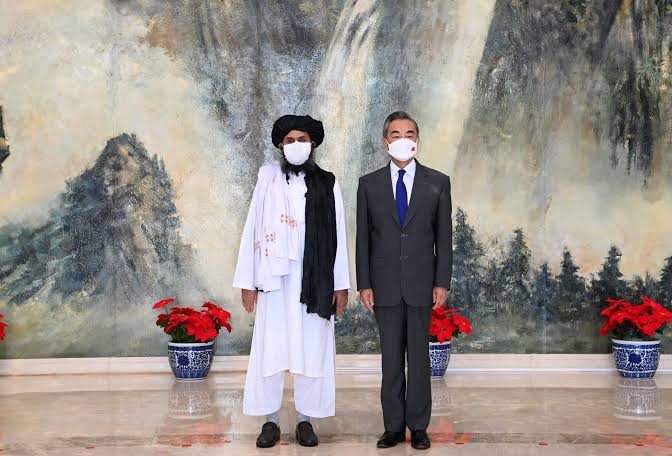Unlike the U.S. which had kidnapped the bride, China’s is an arranged marriage—which it hopes will not end in a bitter divorce, like in the case of the U.S.
In August 2021, President Joe Biden announced the withdrawal of American troops from Afghanistan. A chaotic couple of months, compounded with the surprising speed at which the Taliban took over most of the country, ended America’s longest and most expensive war—or as some would say, its intervention in yet another developing country’s internal affairs. Finally, the two decade long U.S.- led coalition ended when Afghan President Ashraf Ghani fled from his nation, providing the Taliban with the moment of vulnerability they needed to claim power and victory.
China had banked on this inevitable abandonment of Afghanistan by the U.S., and was the first international superpower to have seasoned diplomats approach the tattered nation. This will prove to be extremely advantageous for China, which is already dominant in the middle-east, for three reasons. First, China has arguably proven itself to be the best at repairing and building, which Afghanistan is in dire need of right now, and profiting in the process—Afghanistan has been estimated to have above a trillion dollars in untapped minerals. The second, of course, is that the U.S. withdrawal coupled with the Taliban’s exertion of power has set the nation back 20 years, essentially wiping the slate ‘clean’ for China to take its turn in attempting to fix the same issues the U.S. failed to, but now basking in the opportunity to profit at the expense of 20 years of now wasted U.S. resources.
The third reason has to do with China’s own minority Uyghur population in Xinjiang, in the far-western region of the country. China has continually denied claims of abusing the minority and violating their rights, justifying its actions as necessary in curbing religious extremism and terrorism. They have been accused of many things, like putting more than a million Uyghurs in detention camps—which the Chinese government has officially described as vocational educational centres—and subjecting them to forced labour and birth control among many other gross violations. The United States and many others have described China’s ill-treatment of the Muslim minority as genocide. In the last few decades, Xinjiang has seen an influx of a Han Chinese population, which the state has been accused of orchestrating in an attempt to ethnically cleanse the local population. Activists and their campaigns have been discredited, as a threat of terrorism from exiled members of the East Turkestan Islamic Movement (ETIM).
It has already been established that China was counting upon the Taliban’s takeover well in advance. On the 28th of July, Chinese Foreign Minister Wang Yi met Taliban representative Mullah Abdul Ghani Baradar, and asked that the Taliban cut off its ties with ETIM. Nearly two months later, as the alliance between China and Afghanistan has been made, China’s influence will sweep over the nation, having essentially subdued Uyghurs in Afghanistan from being able to retaliate on behalf of their violated brothers and sisters in Xinjiang.
In these last 20 years, China, for the most part, remained a silent third-party observer while the U.S. struggled with its military oriented approach in Afghanistan. In the mean time, the world has seen China make several deals and investments that work against the U.S. interests in preserving itself as the long-standing, most dominant global superpower. For instance, China’s support has facilitated toxic regimes in North Korea and Iran, in exchange for economic gain. It is almost fitting that as the U.S. troops were withdrawn and the Taliban rose to power again, Afghanistan became a high-priority nation for China to enter into a strategic partnership with.
On the 19th of August, Chinese Foreign Minister and State Councillor Wang Yi said that “the world should guide and support Afghanistan as it transitions to a new government instead of putting more pressure on it.” While the Taliban have proclaimed to rebuild Afghanistan and secure safety for its citizens, they continue to break down on women with brute violence and oppression, and remain the reason for most citizens feeling unsafe. China and the U.S., two opposing superpowers with their fundamentally different approaches in rehabilitating Afghanistan, have drawn away the laser-focus the world momentarily had on the struggle of Afghan women and children, and onto the ‘larger-picture’. Global power relations are shuffling as the two powers try to assert their dominance.
So, where do the Afghan people, especially women, fit on a board where once again, a high-stake game of chess is being played between the U.S. and China? Considering the ongoing blatant discrimination against and oppression of women, to stop putting pressure on the Taliban is to dehumanise every Afghan citizen that is still being denied their basic human rights and essentially being reduced to a pawn. These people and their rights may potentially be sacrificed if China is focused on securing financially larger gains by means of infrastructural changes and improvements to the nation, instead of taking a more humanitarian approach and enforcing their power to influence the Taliban’s current regime. Unlike the U.S. which had kidnapped the bride, China’s is an arranged marriage—which it hopes will not end in a bitter divorce, like in the case of the U.S.
As an independent media platform, we do not take advertisements from governments and corporate houses. It is you, our readers, who have supported us on our journey to do honest and unbiased journalism. Please contribute, so that we can continue to do the same in future.

